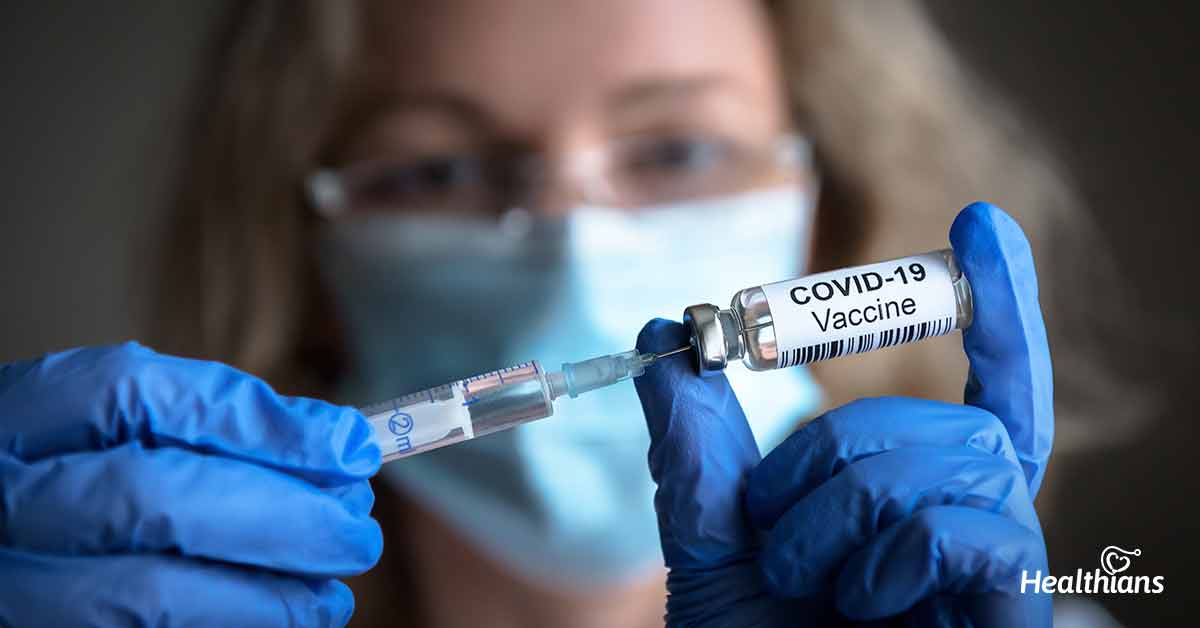Contributed by: Healthians Team
It’s a turbulent time in history. Here and around the world, access to vaccines has expanded exponentially in recent months. With more and more people receiving their jabs, a return to normalcy feels nearer than ever.
While many people are frantic to sign up for vaccines, some aren’t all in for rolling up their sleeves, just yet. This is because the amount of ambiguity surrounding the vaccine is larger than normal. With uncertainties and apprehensions looming large around the Covid-19 vaccine, there is reluctance in many people regarding the efficacy and adverse side effects of the jab. For others, doubts and fears pertaining to its long-term impact on health are also rife.
There are also a few skeptics who defer vaccinations just because they are still unsure what to eat and what not to eat pre and post getting vaccinated against the deadly virus. If this looks familiar to you, don’t worry about it! This article will help you understand what exactly you should eat or avoid before and after your shot.
Although there are no official recommendations on foods that can help to minimize symptoms or support your immune system, both before and after you have the jab, it’s still a good idea to make informed food choices; and maybe now, more than ever is the time to do so.
Helpful foods for dealing with vaccine side effects
Since vaccines amp up your immune response, here are some simple do’s and don’ts in terms of foods and drinks to have a safe Covid-19 vaccination experience.
- Do: First things first, arrive well-rested: According to the American Academy of Sleep Medicine, there is a close association between sleep duration and vaccination response. Getting a good night’s sleep the night before your appointment will help your body generate an optimal immune response. So make sure that you practice healthy sleep hygiene and achieve your best sleep in terms of both quality and quantity.
- Do: Eat a good meal: Preconditioning your body for a few weeks ahead of your appointment is a smart strategy. Nourish your body with healthy food so as to give your immune system the best chance to respond well to the vaccine and to recover quickly. Consider eating whole foods – that is, foods that are as close to their natural form as possible, rather than processed food that are high in saturated fat and have a high amount of calories for at least a few days after the vaccine so as to regulate your blood sugar and prevent anxiety-related fainting. Your best bet would be:
-
- Whole grains instead of refined grains
- Fruits and vegetables, instead of supplements to provide fiber and vitamins
- A steaming hot baked potato topped with chopped green onions and light sour cream, instead of a bag of sour cream and onion potato chips.
- A creamy, refreshing blueberry smoothie made with blueberries, plain yogurt, and a fresh banana instead of blue-colored slushie syrups.
- Warm ginger tea for nausea instead of a cold drink
- Fresh-squeezed orange juice instead of tetra packed sweetened juice
- Do: Stay hydrated: Drinking loads of water before and after should be one of the essentials of your appointment. Inadequate hydration can exacerbate any side effects that you may encounter after administering the vaccine. Experts say that staying hydrated before and after the COVID vaccine allows your circulatory system to spread the new antibodies produced by the vaccine to all of your organs.
- Do: Skip alcohol before and after getting the vaccine: We don’t, unfortunately, have direct evidence at this point to say that drinking alcohol the night before, or shortly afterward, could impair the effectiveness of the vaccine. However previous studies clearly illustrate the association between alcohol and the immune system. We do have data suggesting that drinking could stress the immune system. And it is a well-acknowledged fact that one needs to have a perfect immune system to have a good response to the vaccine, so it is better from alcohol for three days after each injection.




